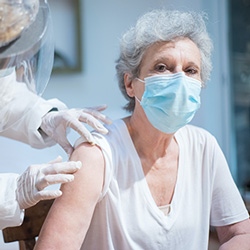Infection Prevention Tips for Seniors

With aging, the immune system naturally weakens, putting seniors at increased risk of illness and infection. In addition, many seniors also have other health conditions that can make them more susceptible. Whether in the hospital, an assisted living facility, out in the community, or at home, there are steps that older adults can take to improve infection prevention.
- Get recommended vaccines. Vaccines can help prevent many diseases such as the flu, pneumonia, COVID-19, hepatitis B, HPV, etc. Talk with your doctor about any vaccines or vaccine boosters that you may benefit from as you age.
- Wash hands often. Germs are everywhere, and they are easily spread from the hands to the eyes, nose, and mouth, where they enter the body. Use soap and water to frequently wash your hands, especially after being in high-traffic areas and touching handrails, doorknobs, elevator buttons, or countertops. If soap and water are not available, use hand sanitizer. Ask others to clean their hands regularly as well.
- Clean high-touch surfaces. Use disinfectant sprays or wipes to clean common surfaces that multiple people may touch. This can help further reduce the spread of germs between people.
- Take care of wounds. If you have a cut, sore, or burn, make sure that it is properly cleaned and covered with sterile gauze or an adhesive bandage. Change dressings as needed to limit bacteria growth and promote healing. Wash hands before and after treating any wounds.
- Finish antibiotics. Even if you are feeling better, make sure you take your entire prescription. Stopping early may mean that the bacteria or infection has not been fully cleared and may return.
- Cover coughs/sneezes. Cough or sneeze into your elbow or a tissue whenever possible. This helps to block germs from spreading as easily through the air, and keeps your hands cleaner so you are not promoting spread through touch.
- Avoid people who are sick. Refrain from visiting with individuals who are sick, or politely ask them to reschedule their visit with you until they are feeling better.
- Speak up about concerns. If you develop any concerning symptoms or have questions about medications or changes in your health, talk to your doctor. Ask about ways that you can be proactive in preventing infection and staying healthy.
Working with an in-home caregiver can help you maintain a cleaner, healthier environment at home. A caregiver can assist with planning and preparing nutritious meals, performing light housekeeping, providing medication reminders, scheduling and attending appointments, and other activities to promote better health.
Contact Always Best Care at (877) 470-2273 to schedule a free consultation and learn more about how you can benefit from non-medical in-home care.





